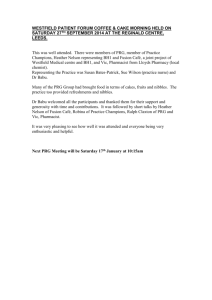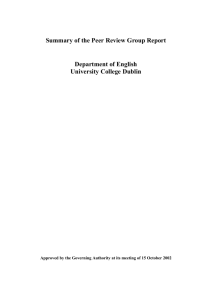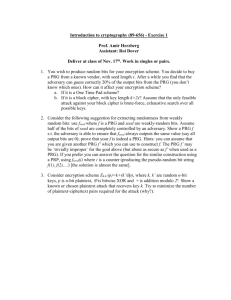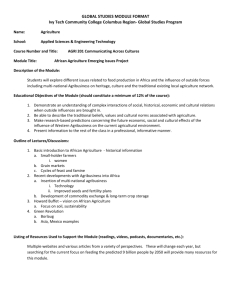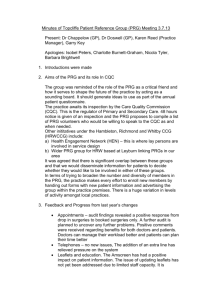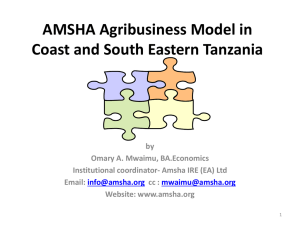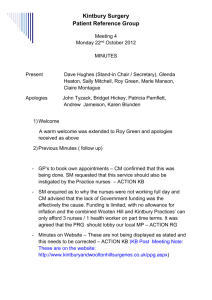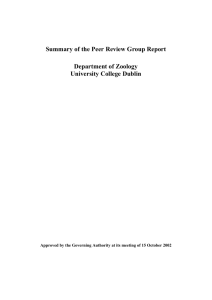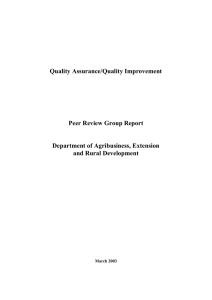Summary of the Peer Review Group Report
advertisement
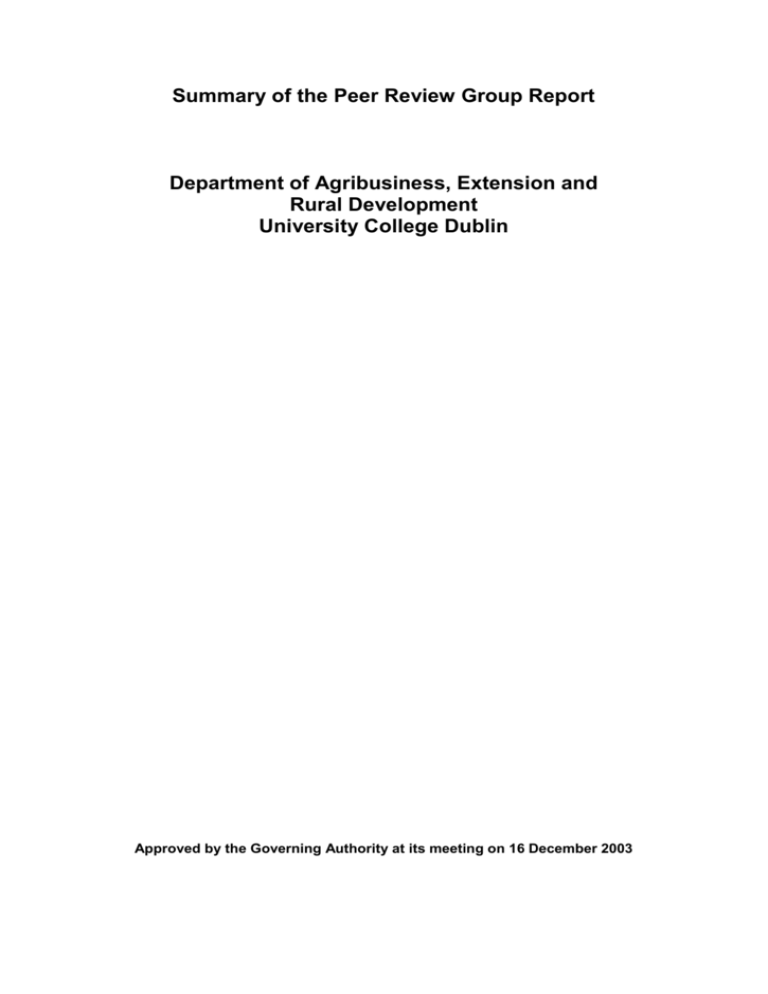
Summary of the Peer Review Group Report Department of Agribusiness, Extension and Rural Development University College Dublin Approved by the Governing Authority at its meeting on 16 December 2003 Department of Agribusiness, Extension and Rural Development Members of the Peer Review Group NAME AFFILIATION ROLE Professor Gabriel Cooney Department of Archaeology, UCD Chair Professor Don Cruickshank Department of Spanish, UCD Rapporteur Professor Andy Deegan Department of Management Information Systems, UCD Cognate Professor Chris Garforth University of Reading Extern Professor Jean Kinsey University of Minnesota Extern Members of the Departmental Co-ordinating Committee Dr Dermot J. Ruane, Chair Dr John O’Connell Ms Anne Markey Ms Anne Finnegan Ms Marie O’Malley Mr Pat Gibbons Ms Timmina Kennedy Professor Jim Phelan Departmental Details The Department of Agribusiness, Extension & Rural Development is located in the Agriculture Building on the Belfield campus at University College Dublin. There is a total of 15 offices which accommodate academic staff, administrative staff and the Rural Development Unit. The Department has major use of Classroom G01 where the Taught Masters Programmes are presented. It also has use of other common Faculty of Agriculture facilities. The work of the Department is undertaken by twelve full-time academic staff, one half-time permanent and one full-time contract administrative staff, one postdoctoral student, one research assistant and eight demonstrators. The Department is involved in eight taught undergraduate/postgraduate programmes as well as research Masters and PhD programmes. Site Visit The site visit took place between 25 March and 28 March 2003. It was noticeable that the site visit timetable was prominently displayed in various places around the Department; in particular, where students would be expected to see it. The PRG met all members of staff, academic and administrative (mostly in groups, but in some cases individually), with the exception of the staff member at present on sabbatical; they also met representatives of all other groups, i.e., research assistants, research Summary PRG Report, Department of Agribusiness, Extension & Rural Development 2 postgraduates, taught-course postgraduates, and three of the four undergraduate years (year 3 students are at present away on PWE). In all cases responses were frank, and in many cases extremely enthusiastic. In the student context, the comment that came up most frequently was the approachability of staff members. The timetable allowed sufficient time for all the PRG activities described under 3.2; in particular, there was more than enough time set aside for meeting members of staff. There was no difficulty in finding room on the timetable for the Library visit, although it was not on the original list (nor was there any difficulty about arranging it at short notice). The PRG was able to make use of the time allotted for rescheduled/additional visits to work on the PRG report. Recommendations of the Peer Review Group Planning and Organisation Clarity on the strategic direction of the Department – this is fundamental Proper strategic planning process Systematic research management process Reduce teaching loads More equitable basis for allocation of teaching loads Departmental executive committee More delegation of programme management Better recognition for research assistants/research students Better internal training for administrative staff Better layout of staff offices Taught Programmes Undergraduate Programmes Instead of proliferating undergraduate programmes, develop a well-integrated and somewhat more flexible programme in Food and Agribusiness Management allowing for “tracks” of electives so that students might be trained in environmental issues, more business skills, or rural development skills. This should hold down the number of separate classes that have to be taught, while accommodating more students. Teaching and Learning – Postgraduate Programme that the Department seriously consider the possibility of combining the teaching for some components of the MRD and MHA, from 2003–2004 on, with a view to (a) enhancing the learning experience of both sets of students, and (b) further reducing teaching loads; that the Department review the content of the second semester of the MHA against the learning objectives set for the programme and the expressed needs and evaluations of current and former students. Research and Scholarly Activity Note the difficulties of taking sabbaticals; the semester leave system is more realistic, and should be organised by the Department. Summary PRG Report, Department of Agribusiness, Extension & Rural Development 3 Staff are teaching too many different classes and too many hours a year, throughout the year. If they are ever to find time to conduct more scholarly work and conduct research and write it up for peer-reviewed publication, the Department must find some way to combine classes and to free up staff time for writing and research. Allowing members of staff to have a semester free from teaching on a regular, rotating basis is essential. SAR analysis of opportunities for published outputs from research students (before as well as after completion of PhD); overall, realistic SWOT analysis (SAR section 5.10.1). Some members of staff have strong research aspirations and are making progress. The type of research being done by research assistants is very focussed on the needs of the funder and is often not suitable for a PhD dissertation or for peer-reviewed publications. The theoretical and empirical analysis in the research at the PhD level should be improved so that peerreviewed publications will be a logical extension of their production. Even though Irish examples, data and issues are used in the research, attempts to make the problem statement and conclusions more generalisable will improve publication rates. The Department’s applied research and its consultancy work are highly regarded by clients. There are many possibilities for publishing research and scholarly work. Non-tier-1 journals abound and should be considered for publishing. To encourage more active and attainable goals in publishing among staff whose principal activity is teaching, the Department might consider starting a working paper series which would provide a precursor paper to published work. It would be considered an unfinished piece, inviting comments by colleagues. Everyone would be encouraged to produce at least one of these per year. The work associated with minor theses is apparently not recognised in promotion or as a scholarly publication. These theses take up considerable amounts of time and a better way to get some mileage out of their output may be found. Many of the theses are important to particular clientele or address a particular interesting problem. A way should be found to package them together and market them (or some of them) for others to see: perhaps on the web, in a special Departmental publication, or in local press and media. Individual research plans might be useful tool, to help individual staff plan their time and identify steps towards getting published. In addition, the Department might hold a monthly seminar where researchers would present their work for discussion by others, again in the spirit of improving it. This would also help to lead to a more cohesive research programme and generate more researchable ideas. It would help to take advantage of the synergies between agribusiness, agricultural economics and RD, and take advantage of the collegiality already existing at a high level in the Department. A need for research leadership reinforces the urgent need to appoint to the chair. Staff should be encouraged to work together to apply for research grants and to co-author papers. This is consistent with the Self-Assessment Report. More joint work would foster mentoring of junior staff members by senior colleagues, introduce senior members to newer theories and methods, and blend the skills in theory and analysis across interest and subject-matter areas to the benefit of all. In the Faculty Research Report Publications for 1998–1999 and for 2000–2001, a total of sixteen journal articles are listed for this Department of twelve people. In addition, there are seven book chapters and two books. This Department is Summary PRG Report, Department of Agribusiness, Extension & Rural Development 4 not without publication and research talent and history. Some programme to expand the publications at a reasonable rate is clearly within their sights. It may be useful to set some targets for increasing the number of peer-reviewed articles that the Department will generate per year. Support could then be given to those who are in the best position to generate those articles to do so. It should be recognised that not everyone will produce peer-reviewed articles regularly, and others will produce many. Department members need to support and respect each other’s strengths. The collegiality that already exists in a diverse Department can be extended to the production of these outputs. Throughout this Report (as outlined above), the PRG has made recommendations which it feels should be acted upon. The following recommendations are particularly important: The origin of the Department in two separate and independent departments continues to present a problem. Any planning for the future development of the Department will need to confront this difficulty. The PRG takes the view that one way in which this can be achieved is by filling the chair as soon as possible. The Department is aware of the need to improve its research and publication record. As long as the University fails to provide financial encouragement for whole-year sabbatical leaves, this will have to be achieved by rearranging teaching to give Department members more research time in general, and teaching-free semesters in particular. A coherent research plan involving research seminars (to include both staff and postgraduates), and other forms of co-operation and encouragement, is desirable. At the same time, the University needs to appreciate that the supervision and production of minor theses in taught master’s courses is part of a department’s culture of research, and should be recognised. The Department can help promote this process by publicising such theses, with the publication of at least abstracts on the Departmental website as a first step. The Department’s greatest success is as a teaching department, producing graduates whose skills enhance the Department’s reputation in the wider community. This success is not bought cheaply, however, and the Department needs to continue with its successful efforts to reduce average teaching loads by integrating courses whenever possible. The Department is well served by the Library as a teaching aid, but the quality of support provided by Computing Services, Buildings and Maintenance, and Services is frequently unsatisfactory, and occasionally a real hindrance to successful teaching and academic life. Response of the Departmental Co-ordinating Committee The Departmental Co-ordinating Committee submitted one and a half pages in response to specific details of the PRG Report and this is included as Chapter 8 of the Report. A copy of the full Peer Review Group Report is available from the Quality Assurance Office. Summary PRG Report, Department of Agribusiness, Extension & Rural Development 5
